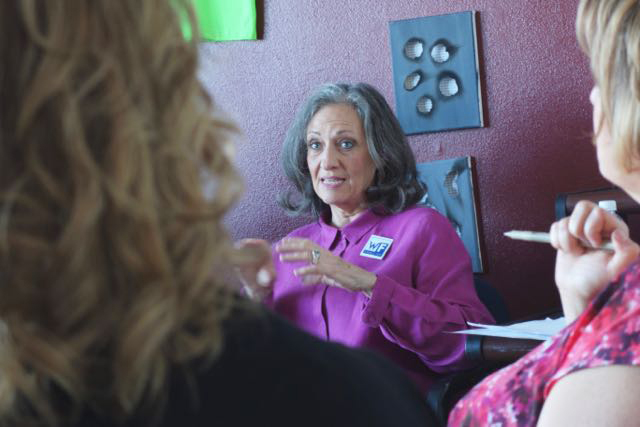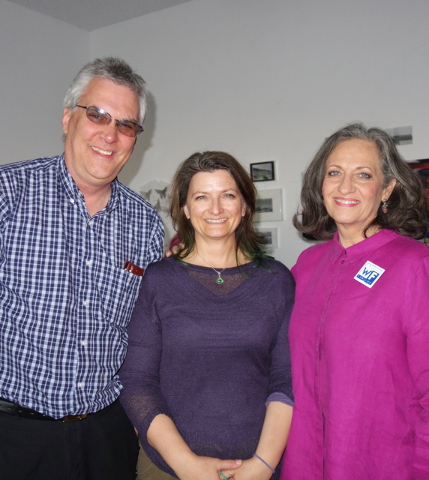Stigma, limited access hinder mental health efforts in Nevada
Monica Gresser, owner of Brazen Architecture, wanted to know more about the stigma and social impact of mental health issues in Southern Nevada. Her firm has a community focus, and selfishly, Gresser said, she needed to know more about the subject. On April 1, she organized a discussion on mental health as part of her company’s series of community-focused discussions.
The news was not good.
Seventeen people were part of the discussion. They included mental health patients, interested friends and social service workers from organizations serving people with mental health conditions. Invited discussion leaders were Chris Doss, clinical director of the Community Counseling Center of Southern Nevada, 714 E. Sahara Ave.; and Cynthia Watson, the center’s community health program director.
Wasteland Gallery in Downtown Spaces, 1800 S. Industrial Road, a store beneath Gresser’s offices near the Arts District, hosted the event. People who attended were asked to participate in the discussion but to use only their first names.
Chilling statistics were a memorable part of the discussion: Nevada has one of the country’s highest suicide rates, in numbers slightly more than one suicide every day. Nevada is last, however, among the states in funds spent on issues related to mental health.
Regarding the stigma of mental health disorders, Watson said, “We are in an environment where clients are embarrassed they have a problem. They don’t even want to use their insurance for treatment because they think it will compromise their employment. God forbid you have several issues — another medical problem and a mental health issue. Life is hard when everything about you as a person is a secret.”
Despite a number of dedicated mental health counselors and case managers in Southern Nevada, the participants agreed that in addition to the stigmas, a lack of funds makes treatment of mental health issues a battle easily lost. The Affordable Care Act has absorbed a number of grant allocations that previously were available to groups in Nevada and elsewhere, they said. Grants are so important in Nevada, said one group member, that a lack of funds could easily cause his agency to shut its doors.
Another discussion participant noted that Nevada not having a state income tax means that funds some other states have are not available in Nevada.
Watson said she prefers the term “our health” to “mental health.”
“A disease of the brain is a disease of one of our organs, no different than a disease of the heart or lungs,” she said. “So we, the government and the insurance companies shouldn’t separate it as a special category. I don’t think there is a single person living who hasn’t encountered another person with mental health problems. These issues are very human.”
Regarding terminology, one discussion participant who said she has bipolar disorder insisted she would not say “I am bipolar” because the disease does not define her. She said she has a disorder just as other people have diabetes or heart problems.
Doss noted that although Southern Nevada needs more mental health funding, help is available for those willing to accept it.
“My personal joy,” he said, “is in helping someone come from a very dark place into the light.”
People come to dark places for many reasons. Doss noted that “Before 1975-76, most people with severe mental health issues were institutionalized. We put them away, and nobody paid attention. Then we decided we could mainstream these people in the community. We did that, but we forgot to set up ways to deal with these cases in terms of places to live, treatment, easily accessible medications, etc.
“Today, we also see people who are still suffering the aftermath of the recession, losing houses and jobs. We also have newcomers to the city who chased a dream that Las Vegas would welcome them with open arms and found that not to be the case. Social Security disability payments for mental health diagnoses (are) very difficult to obtain, so many of those affected with mental health issues are simply homeless.”
And do the largest employers in Nevada recognize the problems of mental health?
“We get virtually no help from the mining and casino industries” was the consensus of the group. Another comment, regarding individual donors, “Money goes to puppies, not to people with mental health conditions.”
The solution?
In personal terms, the group talked about simple kindness: a smile, knowing neighbors, noticing changes in a person’s personality, and caring about others. One example familiar to case workers was simply staying with a person who appears to be in a mental health crisis and not leaving that person alone.
Kindness may also involve going with a person to one of the agencies that can help or even accompanying a person to a hospital and spending the necessary hours helping with paperwork or sitting in a waiting room until service is available.
Other statements that many agreed upon were the need for more education of patients, their family members and the general public about mental health issues, the election of individuals who “care about the people” and better communication among the various agencies providing services.
A new organization that seems to provide hope among the agencies is the Nellie Bly Leadership Society, described as “Nevada’s first and only philanthropy society dedicated to nonprofit mental health services.” To read more about the organization, visit viewnews.com.
For more information on the Nellie Bly Leadership Society, 714 E. Sahara Ave., visit tinyurl.com/nbcccsn or call 702-369-8700.





























